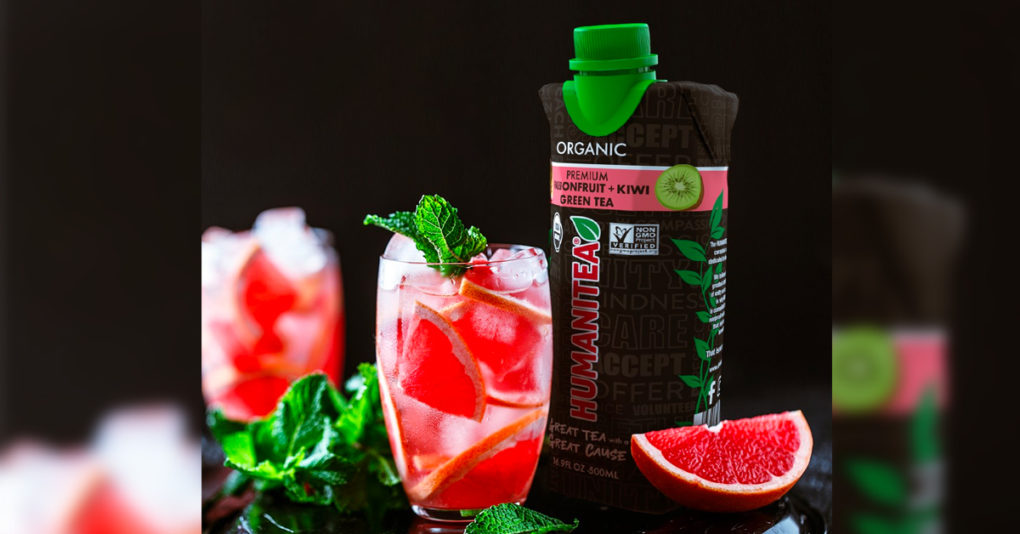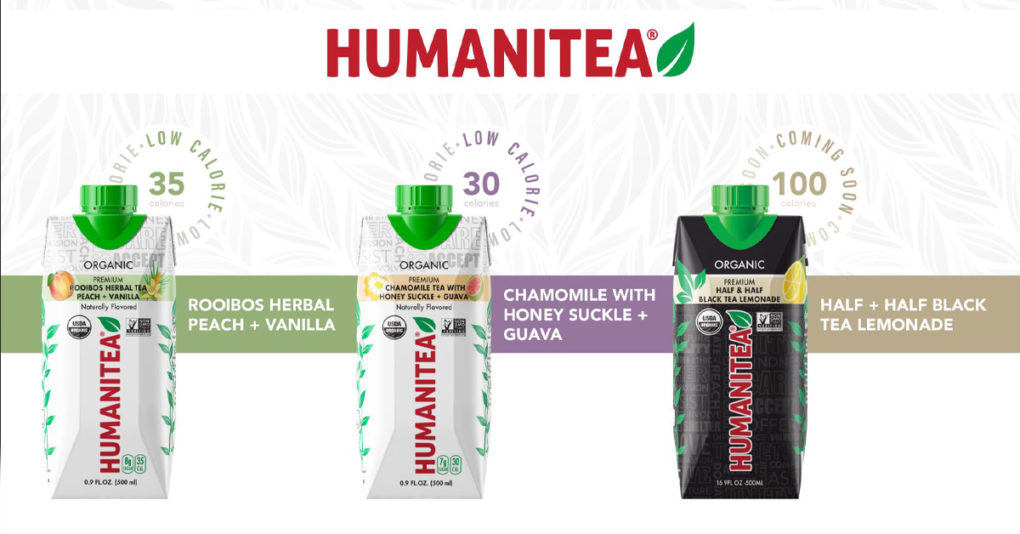
After acquiring the small startup brand in 2020, the owners of RTD tea maker Humanitea are getting ready to pour gas in the tank, beginning with a slate of three new flavor innovations.
This month, the brand announced its first new innovations since its rebrand in 2021 – Chamomile Tea with Honeysuckle + Guava and Rooibos Herbal Tea with Peach + Vanilla, which are available now, and an upcoming Half +Half Black Tea Lemonade. The first two innovations are low in sugar, with 7-8 grams per 16.9 oz. Tetra Pak and 30-35 calories each. The Half + Half, meanwhile, will be 100 calories per serving. Online the drinks sell for $27 per 12-pack, or around $2.25 per unit.
The new innovations will bring Humanitea’s total portfolio to eight SKUs, all of which are organic, non-GMO and packaged in 16.9 oz. Tetra Pak cartons.
Humanitea was founded in 2012 by entrepreneurs Andrew Estrada and Tracy McQuaid, and the initial product looked significantly different from the version that exists today: to start, it came in a PET bottle and wasn’t organic. However, according to chief sales officer Joe Garza the brand had been slow to grow and in 2020, he purchased it himself, alongside CEO Jeff McClelland and his brother, Lance McClelland.
According to Garza, the new ownership team had been looking to create a beverage company with a mission focus that could help them give back to charity in addition to building a brand. When the opportunity to purchase Humanitea arose, he said they were enamored with the name – which they believe is one of the brand’s strongest assets – and saw an opportunity to appeal to millennial and Gen Z consumers. They transitioned the brand to more sustainable Tetra Pak packaging (McClelland previously led an aseptic packaging business in California) and reformulated the teas to be non-GMO and organic.
“We came into the tea category at a time when I felt [it] needed innovation,” Garza said. “There was nothing that really gravitated to the millennials, nothing that was fresh, innovative, or that was, let’s call it, cause-driven and premium.”
While the tea category has seen lower growth in recent years, the space has since the pandemic experienced an influx of differently positioned brands: think Liquid Death, Just Ice Tea, Swoon, Halfday, Saint James, Ryl Tea and Weird Tea, among others. Within the refrigerated space, legacy regional brand Milo’s has experienced a sales surge over the past two years, energizing the entire category.
According to Circana, the ready-to-drink tea category in U.S. retail grew 4.8% to over $8.3 billion in the 52-weeks ending October 8, 2023. While category leader Pure Leaf (owned by PepsiCo) used price hikes to offset -9.4% unit sales and generate total dollar sales growth of 4.1%, other brands have reported stronger overall growth in recent months: AriZona’s dollar sales rose 10.4% in the period with volume up 2.1% and Coke’s Gold Peak reported dollars up 15.9% with a 3.8% volume lift.
Further from the top of the category, Liquid Death’s canned tea line reported dollar sales at $13.6 million after launching earlier this year, while newer RTD boba tea makers like Joyba (+388.3% dollar sales) and Inotea (+228.9%) saw rapid growth. Functionality has also played a role in tea’s expansion as yerba mate maker Guayaki was up 7.4%.

Humanitea’s owners, however, believe there is still plenty of room for another brand to establish itself in the category, particularly with its sustainability and mission-minded position. The brand contributes a portion of all proceeds to charities, including Together We Rise, which supports children in foster care, and nonprofits supporting mental health care and awareness. The latter is particularly important to McClelland, who cited suicide prevention as an important issue where he hopes to raise awareness.
Beyond the product itself, Garza and McClelland feel they have experience in the beverage industry that Humanitea’s original founding team lacked. McClelland has nearly three decades as a CEO at various beverage companies including Kids Healthy Foods, LLC and Qure Energy. Garza, meanwhile, has held sales roles at companies such as Cytosport and Vitaminwater, and most recently worked with McClelland at Qure as VP of sales.
While most of the day-to-day is handled by a team of “five to 10,” McClelland said Humanitea also works with several brokers and third party partners to support the business. However, the brand will be looking to grow its marketing team in the new year and is preparing to launch its first marketing campaign in the first half of 2024.
“It’s better to have a well-experienced, high quality team with lower overhead, than to have a bunch of people doing a bunch of different things,” McClelland said.
At the time of the acquisition, Garza said Humanitea was sold in about 40 stores around El Paso, Texas. Today, the new ownership has taken the brand to 3,800 accounts with distribution primarily throughout the West Coast and Midwest.
According to Garza, Humanitea has cast a wide net in its channel strategy, simultaneously targeting the natural, conventional grocery, convenience and foodservice channels with retail partners like 7-Eleven, Sprouts, Dollar General and Albertsons, among others. Its distribution model includes KeHE as well as select DSD partners. For c-store, the brand works with Coremark and McLane Company.
That multi-channel approach helped to inform the design of its latest innovations: its black label cartons do well as grab-and-go items in convenience, but the new white labels on its Rooibos and Chamomile varieties are intended to help appeal to grocery and natural channel shoppers.
“The goal is to grow our business both in number of stores, but we also want to dig deeper where we’re at,” Garza said. “So as much as we’re looking to widen our distribution, we’re also looking to dig deep and really invest with the partners who have invested in us today.”